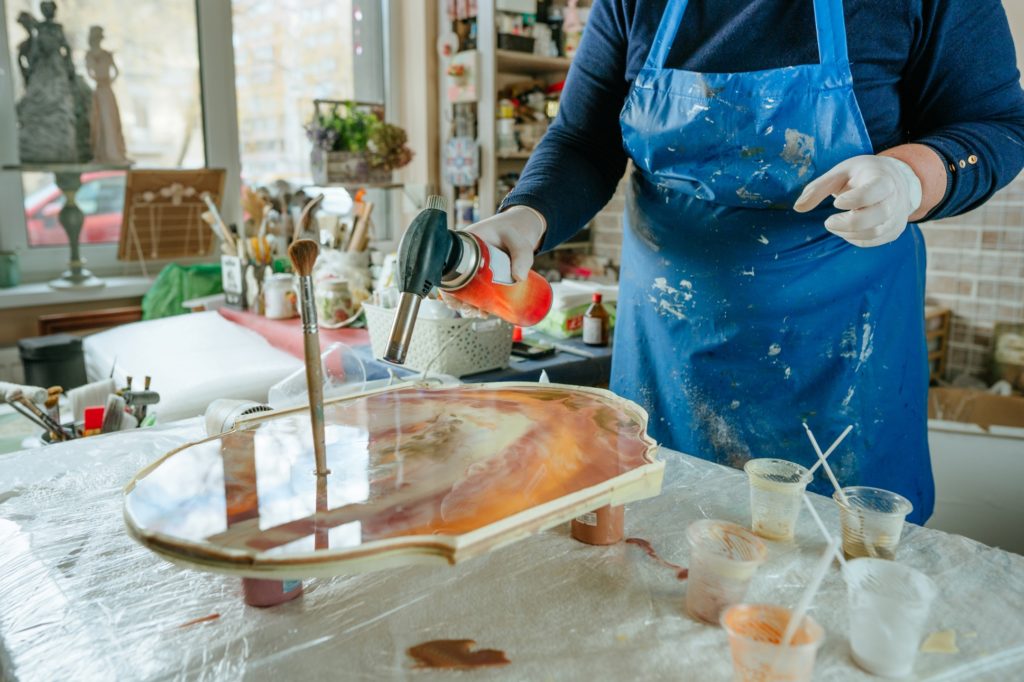Epoxy has become a go-to material for artists, designers, and builders. Its versatility allows it to be used for everything from intricate resin art to heavy-duty flooring solutions. Whether you’re crafting a unique tabletop or reinforcing a concrete surface, epoxy offers strength, durability, and a glossy finish that makes it a favorite across different industries.
This article explores the various ways epoxy is used in art and design, along with its practical applications in construction and flooring.
Epoxy in Artistic Creations
Epoxy resin is a game-changer in the art world. Its liquid form can be poured into molds or layered on surfaces to create stunning designs. Once cured, it transforms into a hard, glass-like material, making it ideal for preserving intricate details and achieving a smooth, polished look.
Resin Pouring and Abstract Art
Many artists use epoxy for fluid art, where pigments and additives are mixed into the resin before being poured onto a canvas or wooden panel. The result is a high-gloss abstract piece with swirling colors that mimic natural patterns like marble, ocean waves, or galaxies. Unlike traditional painting techniques, epoxy resin allows for a depth and vibrancy that can’t be achieved with other mediums.
Jewelry and Small-Scale Crafts
Epoxy is also popular in jewelry making. By embedding dried flowers, metallic flakes, or tiny objects into resin, designers create custom earrings, pendants, and rings. Since epoxy is lightweight and durable, it’s an excellent alternative to glass or ceramic.
Functional Art: Tables and Countertops
One of the most well-known applications of epoxy in design is its use in furniture. River tables—made by filling natural wood gaps with pigmented epoxy—have become a sought-after style. The resin enhances the wood grain while creating a seamless and water-resistant surface, making these tables both practical and visually striking.
Epoxy in Interior Design
Beyond small-scale art, epoxy plays a big role in interior aesthetics. Designers use it to create eye-catching surfaces that combine beauty with function.
Wall Panels and Decorative Accents
Epoxy-coated panels are used to mimic expensive materials like marble or onyx without the high cost or maintenance. These panels can be installed on walls, backsplashes, or feature areas, offering a sleek, custom look that’s easy to clean.
Epoxy Flooring: A Durable and Stylish Option
In addition to being used for decorative elements, epoxy is a popular flooring choice for homes, businesses, and industrial spaces. It’s known for its strength, resistance to moisture, and ability to withstand heavy foot traffic.
For those looking for a Melbourne epoxy flooring service, the benefits go beyond aesthetics. Epoxy flooring provides a seamless finish that prevents dust and bacteria buildup, making it a hygienic option for hospitals, kitchens, and commercial spaces. It’s also customizable, with options for metallic finishes, decorative flakes, and even 3D designs.
Resin-Coated Benchtops and Bars
Epoxy is commonly applied to benchtops in kitchens, bars, and restaurants. It protects surfaces from heat, moisture, and daily wear while offering a polished, high-end look. Since it can be tinted in any color or pattern, designers often use it to replicate natural stone at a fraction of the price.
Structural Applications of Epoxy
While epoxy is widely used in art and design, its industrial and structural applications are just as impressive.
Reinforcing Concrete and Wood
Epoxy adhesives bond exceptionally well to different materials, making them useful for reinforcing weak concrete or repairing cracked wood. Builders often use epoxy injections to seal concrete fractures, preventing water damage and prolonging the lifespan of structures.
Waterproofing and Corrosion Resistance
Epoxy coatings are commonly applied to marine structures, bridges, and metal frameworks to protect against rust and water damage. The coating forms a protective barrier, preventing deterioration in harsh conditions.
Aircraft and Automotive Applications
Epoxy-based composites are essential in aerospace and automotive manufacturing. These materials offer a combination of strength and lightness, making them ideal for airplane parts, car bodies, and even wind turbine blades. The durability and impact resistance of epoxy-based components ensure long-lasting performance in extreme environments.
Industrial Flooring for Heavy-Duty Use
Factories, warehouses, and car parks rely on epoxy flooring for its ability to handle weight, chemicals, and constant movement. Unlike traditional concrete, epoxy-coated floors resist stains, cracks, and abrasion, making them a cost-effective long-term solution for high-traffic areas.
The Advantages of Using Epoxy
Regardless of its application, epoxy offers several benefits that make it a standout material.
Strength and Longevity
Epoxy creates a hard, impact-resistant surface that doesn’t crack or peel easily. When used in flooring or furniture, it extends the lifespan of the material underneath.
Customization and Aesthetics
With the ability to add colors, patterns, and textures, epoxy is one of the most versatile materials for both decorative and practical uses. Whether you're aiming for a high-gloss modern finish or a rustic wood look, epoxy can be tailored to match any style.
Low Maintenance
Epoxy-coated surfaces are easy to clean and require minimal upkeep. They resist stains, moisture, and bacteria, making them perfect for areas that demand hygiene, such as hospitals and food preparation zones.
Eco-Friendliness and Sustainability
Some epoxy formulations are designed with environmental impact in mind. They help reduce material waste by extending the life of surfaces and structures, minimizing the need for replacements.
Final Thoughts
From intricate jewelry to industrial flooring, epoxy has a wide range of applications that make it indispensable in both creative and structural fields. Artists use it to craft unique pieces, designers rely on it for custom interiors, and builders depend on its durability for long-lasting construction.
Its combination of strength, aesthetic appeal, and versatility makes epoxy a material that will continue to be valued in different industries for years to come.

